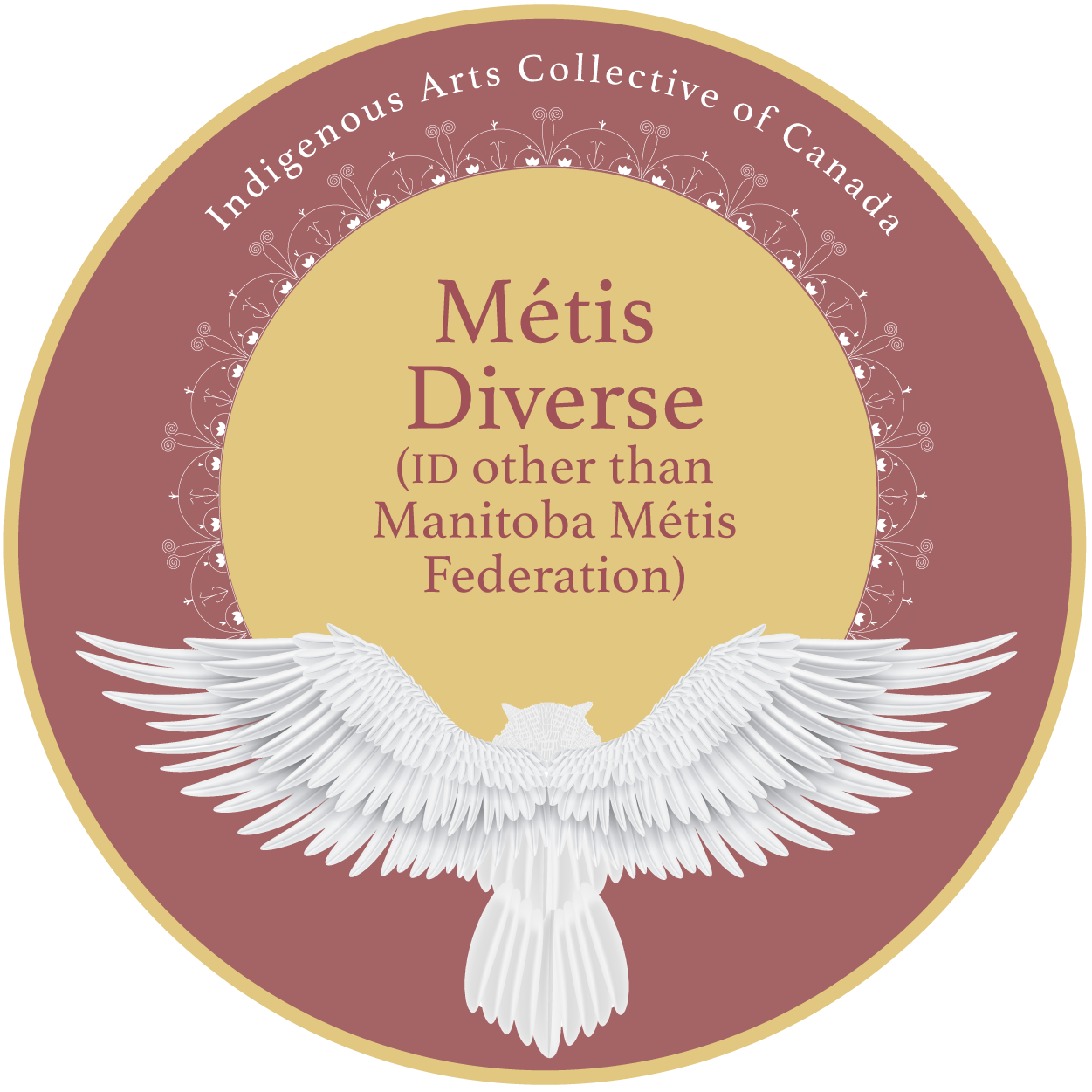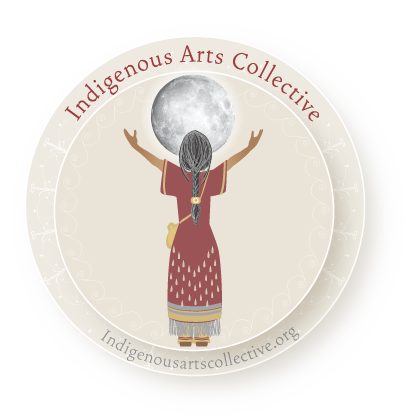
Organizational Challenges
As the IAC manages challenging funding limitations, we limit our resources to serving specific priority groups in 2024.
In 1990, the United States created a truth-in-advertising law called The Indian Arts and Crafts Act that prohibits misrepresentation in the marketing of Indian (Native American/Indigenous) art and craft products. Canada has not prioritized this work and the responsibility entirely falls on individual organizations and artists to self identify and validate their own work as authentically Indigenous. The IAC as a National Arts Service Organization is committed to ensuring that viewers have an easy way to identify artists within our membership by clearly labeling our membership lists, platforms and programming. The IAC will not tolerate misrepresentation and fraud will result in loss of membership.
Organizational Mandate
The IAC firmly supports requirements that obligate individuals to validate their relationship to living Indigenous peoples and communities.
Furthermore, the IAC requires that all member artists have a firm commitment to:
- the protection and development of endangered Indigenous art forms,
- maintain the integrity and history of traditional Indigenous art forms,
- contribute to the transmission of Indigenous knowledge within our families and sovereign nations.
Indigenous Identity
At present, there is a particularly volatile climate surrounding Indigenous identity. People who perpetuate the myth that Indigenous identity is self determined and not reliant on any relationships with Indigenous nations/tribes or communities are now called 'pretendians' or 'race shifters'. These people claim Indigenous identities and many are 'self identifying' without having actual relationships/connections to people and communities. Many of these organizations and individuals are getting access to funding that is meant for Indigenous organizations, peoples and communities. Note: this does not include victims of Indian child apprehension and Indian displacement practices (Sixties Scoop, residential school, incarceration) by government and church run programming. The IAC stands firm in our strategy of transparency; all IAC members are required to validate their identity.
Funding and Services Access
Funding specific to Indigenous peoples or communities is in place for specific reasons such as to improve quality of life, increase services to marginalized communities and to mitigate damages to cultures as a result of colonization and cultural genocide.
The IAC strongly opposes the distribution of Indigenous funding and services to non-Indigenous people. Furthermore, the IAC is taking steps to ensure that the funding received is only used toward programs and services for Indigenous peoples.
2024 sees financial hardship for the IAC, donations are welcome and we may have to temporarily limit services.
Priority groups for 2024: Indigenous peoples on reserves, FN Indigenous women and youth off reserve.
It is the responsibility of IAC members to present a clear biography and engage viewers.
IAC Solutions • A Timeline
This process is fluid and fast changing...
Important notes:
Existing and new members will not see any changes to their membership other than the addition of an identity verification. If you are a member participating in our programming and receiving emails, this will not change. IAC is inclusive and we're here to help everyone as long as we have funding to do so.
The IAC is actively monitoring the situation and adopting best practices exampled by organizations and people who are making change through research. We recognize a need to move beyond self identification. We are a First Nations women led organization (all board are status card numbered Indians under the outdated Indian Act) and the internal arguments of the non First Nations peoples are not ours and so we hold no opinions; we do not enter into conversations regarding who is and who is not Indigenous. We are however walking through financial unknowns and limit our resources to include those members as a priority group.
In all cases, IAC doesn't not support or promote pan-Indigenous groups or unassociated First Nations or Métis organizations and maintains that criteria and rules may change. We will do our best to remain up to date.
In conclusion, these efforts by the IAC are meant to protect the membership that has honoured us with their trust.
Our goals also include:
- providing viewers of our website authentic resources,
- providing seekers of workshop facilitators vetted Indigenous artists,
- provide researchers and buyers of Indigenous art, vetted Indigenous artists.
Some resources include:
Quick Reference

Certificate of Indian Status
Inuit Land Claim Organization
Métis
Unverified, unrecognized, no ID
IAC funding prioritizes programming and services for:
1) Indigenous women and youth living on reserves,
2) Indigenous men on reserves and
3) FN Indigenous women and youth off reserve. Funding increases will result in expansion of priority groups served.
Members who have not submitted ID after July 15, 2024 will be listed as 'Unverified'.
It is the responsibility of IAC members to present a clear biography and engage viewers.
IACC Indigenous Identity Strategy
Priority Groups

Inuit
Inuit are Indigenous people of the Arctic. The word Inuit means "the people" in the Inuit language of Inuktut. The singular of Inuit is Inuk.
Many Inuit in Canada live in Inuit Nunangat, which means "the place where Inuit live."
Inuit Nunangat is comprised of 4 regions:
- Inuvialuit (Northwest Territories and Yukon)
- Nunavik (Northern Quebec)
- Nunatsiavut (Labrador)
- Nunavut

Cert. Indian Status
Verified First Nations have presented a Certificate of Indian Status (Status Card).
Indian Status is the legal standing of an Indian under the outdated Indian Act of 1876. While most Indigenous peoples reject being labeled as 'Indian', they are still subject to that classification by the Canadian federal government. The government has 'numbered' all First Nations people whose genealogy aligns and Certificate of Indian Status is the identification card used to access government programs and services.
Indian Act has undergone amendments since it was first passed in 1876, but it retains its original intention and is administered by Indian and Northern Affairs Canada (INAC). The Indian Act is a part of a long history of assimilation policies that intended to terminate the cultural, social, economic, and political distinctiveness of Aboriginal peoples by absorbing them into mainstream Canadian life and values.

Manitoba Métis Federation
The Manitoba Métis Federation is the national government of the Red River Métis.
IAC Indigenous Identity Strategy
Transparency is our responsibility, engagement is yours.

Métis is Diverse
There are numerous Métis organizations and members can register based on 'where they live' rather than their ancestral land base (as it is with First Nations and Inuit). Due to funding restrictions, these organizations are not on the IAC priority list but certainly may be IAC members. IAC Métis members may have provided one of the following IDs. We insist that the artist include their identity in the bio of their profile page. We suggest also that the website visitor read the artist profile page for clarity and reach out to the artist to verify that they align with the visitors' needs:

Unverified
In 2023-2024, the IACC board of directors reached out to all members asking that they provide support to their self identification as Indigenous peoples. Those members who supplied documentation supporting their identity as Inuit, First Nations or Manitoba Métis have been matched to those communities and are considered 'priority groups' to receive access to IACC programs and services. All members who are outside of those communities (Métis other than MMF) have their own distinct category. Members who didn't provide ID or their ID did not fit into one of those communities are marked as unverified, insufficient or from an unrecognized group of people.
IACC website visitors are encouraged to reach out to these artists directly to verify that they align with the visitors' needs.
IACC members are highly encouraged to include their identity in the bio of their profile page.
